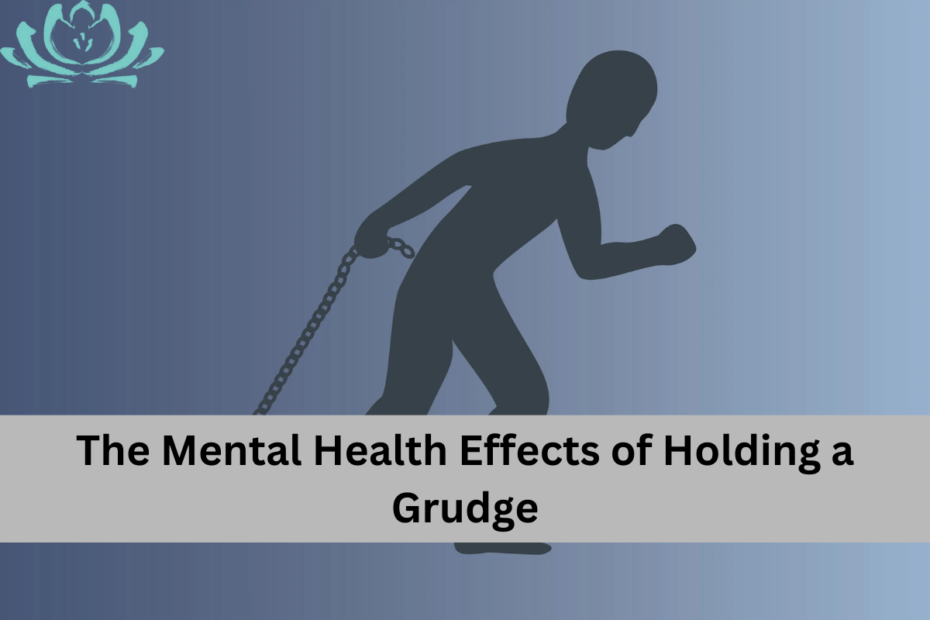The Mental Health Effects of Holding a Grudge:-Holding a grudge means feeling angry, bitter, resentful, or other negative emotions after being hurt. Grudges usually result from an event, but sometimes they’re formed after seeing someone want to hurt you. Those who made you angry may consume you.
You still mad after an incident? Some people hold onto negative feelings longer. Every time you think about or interact with that person, you may relive multiple past misdeeds and express your displeasure or remain silent. Sometimes you unknowingly hold a grudge. Whatever your intentions, holding a grudge hurts you and the offender. Let go of grudges and manage anger to avoid emotional, physical, and social harm.
The Mental Health Effects of Holding a Grudge
Why We Hold Grudges
- Negative childhood experiences often cause grudges. This is a common response to someone who intentionally, callously, or thoughtlessly hurts you without apologising.
- Hold out if you have low self-esteem, poor coping skills, were embarrassed by the hurt, or are short-tempered.
- All of us hold grudges, though some more than others. Blaming and resenting others could protect you. Some may not realise they’re inciting bitterness. Big and small issues can cause bitterness.
- Holding a grudge may result from minor slights like not being picked for a team, taking your preferred seat, not being included on a group text, not being invited to an event, being called the wrong name, not noticing your new haircut, looking at you strangely, or bumping into you.
- Of course, bigger mistakes like forgetting your birthday, not helping you when you need it, making a thoughtless or rude comment, or letting you down cause long-term anger. Grudges form when you praise yourself, lie, accuse others, forget something, or make a pass at your partner or crush.
- Holding grudges with the wronged party can worsen the cycle of bitterness, anger, and blame. Grudges make thinking negative and distorted.
- Grudges can last forever or fade. Healthy well-being requires managing occasional anger, frustration, disappointment, disillusionment, feeling attacked, ignored, or let down, or other negative feelings towards others. Grudges usually backfire.
Grudge-Keeping Bad?
- A grudge is unhealthy. It keeps you angry and past-bound. Resentment hurts you, not them. Grudges bind you to painful events and prevent problem-solving.1
- Resentment won’t fix your issue. Fixating on negative emotions can lower well-being and happiness, research shows.2
- Consider that “holding a grudge,” from Old French grouchier, means “to grumble” and is related to English “grouch.” Old English and German words mean “to complain,” “to wail,” “to grumble,” and “to cry out.”
- The original hurt and a grudge can be harmful and painful.
Mental Health Impact
- Grudges harm mental health in many ways. Holding onto anger makes you angrier, most importantly.1 Instead of acceptance and resolution, negative experiences can cause resentment, bitterness, hopelessness, emptiness, or enragement.
- Naturally holding onto negative feelings exposes you to more negative emotions and thoughts, which can change your view of negativity. Thinking negatively lowers well-being.
- Reliving a bad event and emotions can be upsetting, draining, and frustrating because only your anger or hurt changes. Ruminating on a bad event makes it seem like yesterday, studies show.
- Exaggerating a grudge is common and can make it worse. Your self-inflicted wound will likely worsen.
Resentment and uncensored anger can cause stress, worry, defensiveness, aggression, and negativity, causing mental health issues like:
- Anxiety
- Acting aggressively
- Depression
- Uncontrolled emotions
- Other people’s moods
- Self-harm or suicide thoughts
- Call 988 for trained suicide prevention help from the National Suicide Prevention Lifeline. Call 911 if you or a loved one is in danger.
Also Read:-Want to Take a Solo Trip? These Are the Best Places in the U.S. to Visit
- Research shows that unhealthy emotional regulation, blaming others, suppressing emotions, and holding onto negative feelings increase negative feelings. But forgiveness and acceptance can boost mental health, stress, and well-being.
- Holding onto anger increases revenge and aggression.Stress burnout.
- Studies show that holding grudges causes stress and harms physical health.
Many health issues result from chronic stress:
- Cardiovascular health Digestion.
- Reproduction.
- Sleep.
- The immune system.
- Stress can cause headaches, insomnia, upset stomachs, heart disease, and asthma, especially in change-resistant people.10 Forget grudges to reduce stress and symptoms.
- Intense anger impairs cognition and executive function. A study found high anger impairs decision-making. Grudges also cloud memory and reality.

Social Impact
- A grudge can affect your social life. Bitterness over hurtful situations can break families, friendships, and social groups.
- Terminating toxic relationships may help.
- Before cutting someone out of your life, consider if you’re overreacting or can fix the relationship. Resentments can affect relationships beyond the offender, including those who disapprove of your inability to let go.
- Even without grudges, people may distrust or avoid you. You may also lose perspective on other aspects of your offender relationship.
- Focusing on your friend’s last-minute cancellation may make you forget they’re reliable, overwhelmed at work, or that you cancelled on them.
- You may forget that your friend’s tardiness is unrelated and that you don’t want to ruin your friendship by getting mad. If you want to repair your relationship, forgive your partner for something terrible.
- Be aware you’re teaching your kids. Your kids learn to hold onto bitterness instead of forgiving, accepting, grieving, conflict resolution, or other healthier coping methods.
Possible Grudge Benefits
- Consider the pros and cons of holding grudges. Holding a grudge may be better than ignoring your feelings.
- Holding a grudge may help them admit their feelings about themselves and the offender.
- Although talking to the offender is best, holding a grudge may work better than ignoring a situation or emotion.
- Holding a grudge can fix hurtful or stressful behaviour.
- Disappointed people hold grudges. It’s okay to be upset or resentful, but confronting the person may be healthier, especially since misunderstandings or misplaced expectations often cause these issues.
- People want someone to blame even when no one is at fault, which makes holding a grudge appealing, especially if you keep your feelings to yourself and let them go.
- Even if unfair, you may hold a grudge if someone bumps into you and makes you drop your drink and ruin your favourite skirt.
- Although your anger may be unwarranted, it may help you cope with the event. Keeping a grudge may let you vent without confronting the innocent person, which is risky.
- Though it may not be ideal, this may be better than angering or accusing others in awkward situations.
Propensity to Hold Grudges
- According to research and anecdotes, some hold grudges longer. Jealousy, sensitivity, immaturity, negativity, and impulse control cause grudges. Cultural, lifestyle, parenting, environmental, genetic, and other factors affect resentment.
- Grudge-holding decreases with empathy, resilience, self-regulation, and coping skills. Regular exercise improves flexibility and forgivingness, research shows.
- Research shows that irritable and emotionally volatile people hold grudges and blame others. ADHDers may hold grudges due to anger and irritability.
- Some become embittered, while others are wired (or work hard) to recover or confront hurts. Some of this variance is uncontrollable, but anger management and coping can be improved.
Grudges vs. Healthy Coping
- How do you tell anger from resentment? Healthy anger usually subsides with time and appropriate resolutions like talking it out, getting an apology, resolving a misunderstanding, accepting, or ending the relationship. Grudges prevent forgiveness and resolution.
- Determine if discussing what happened makes you feel better or worse. So you may be managing your emotions. Thinking about or discussing a grudge may make you more upset, overwhelmed, or agitated.17
- If unsure, imagine a friend recalling the event and your response. Would you stay bitter? Are you comfortable (or embarrassed) telling someone close about your grudge? Assess your reaction for justification or overreaction.
- Ask a trusted friend how you’re handling the situation to determine if you’re angry or holding a grudge. Discussing your feelings and situation helps you move on.
Grudge-Release Tips
- A counsellor, friend, or loved one may help you release bitterness and grudges. Escape to think clearly and plan better. Therapists can explain why you hold grudges and handle difficult situations.
- Put yourself in someone’s shoes before judging. Consider that your worst fears may be wrong. Others’ misdeeds aren’t always your fault. Perhaps they were having a bad day. They may have misinterpreted your request or had bad luck despite their best efforts.
- Forgiveness and stress management are positive coping skills.
- Accepting feelings, reality, and apologising.
- Assess your role and potential changes.
- Empathising with yourself and aggressor.
- To forget your problems, watch a movie, read a book, draw, or do anything else you enjoy.
- Doing yoga.
- Exercising.
- Positive thinking.
- Get enough sleep Master anger management.
- Let go of the past.
- Hearing another’s view.
- Being mindful.
- Both-party plan closure.
- Promoting calm breathing.
- Don’t judge feelings18.
- Texting, emailing, or writing your grudge target.
- Healthy limits.
- Family or pet time.
- Talking to supportive friends.
- Record your feelings.
- Process resentments; holding onto them is unhealthy for everyone. Avoiding problems and forgiving quickly are bad too.
- While processing difficult emotions, allow yourself to grieve, be mad, or wallow. Keep your grievance-coping methods temporary. Correct the issue and move on.
If you like this article about The Mental Health Effects of Holding a Grudge Please share this article with your friends and family members.


